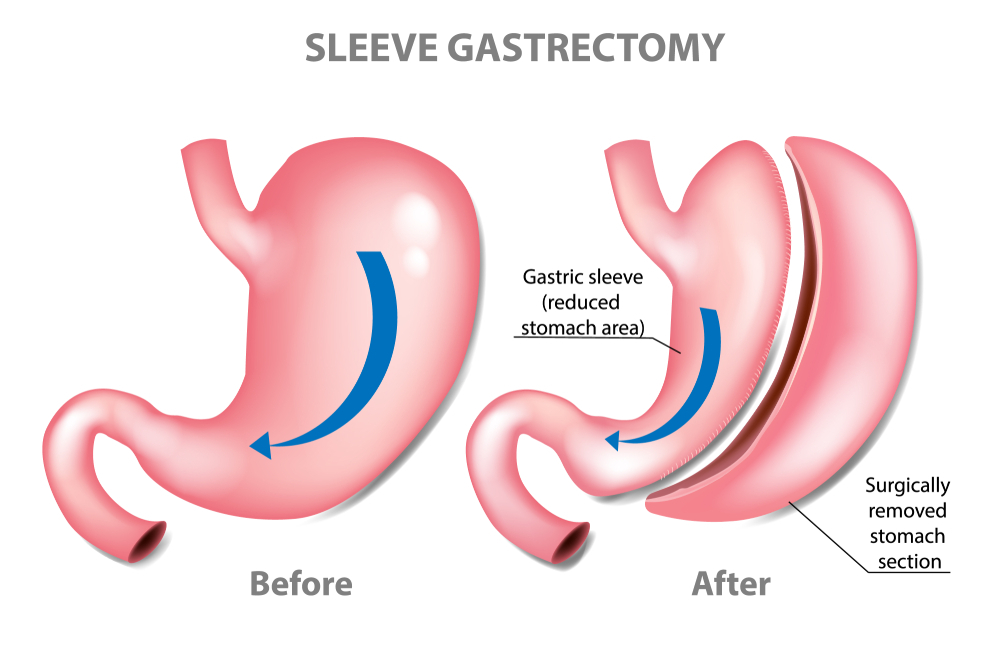WHAT IS GASTRIC SLEEVE?
Are you tired of maintaining diets and lifestyle changes and still not being able to lose weight? Or are you overweight with a BMI of 40 or more? Bariatric Surgery is an option for rapid weight loss, in which a part of your stomach is removed. Gastric Sleeve or sleeve gastrectomy is one of many types of bariatric surgery, and is a surgical procedure opted for weight loss in which a portion of the stomach is surgically removed along its curvature to get a sleeve like structure in reduced weight. In this surgery, the stomach is reduced to 10 to 15 percent of its original size, which results in a sleeve or banana-like stomach being full early and restricting too much eating. You will lose weight being able not to eat too much and also due to less appetite stimulating hormones. If you are looking to have a gastric sleeve for weight loss, you must know all its aspects as described below.
Points we have covered...
HOW GASTRIC SLEEVE IS PERFORMED?
Gastric sleeve is generally performed under general anesthesia as a minimally invasive procedure via laparoscopy (in which a long thin tube with instruments and camera is passed inside your stomach via small incisions and surgery is performed). In the surgery, the stomach is divided into two unequal parts, with the outer 80 to 90 percent to be removed and the inner is made into a sleeve.

The surgery will continue for an hour, after which you will be monitored for another hour in which you will wake up from anesthesia and your vitals will be monitored. After that, you will be monitored for a day or two for post operative care and then discharged. As the surgery is minimally invasive, it generally heals quickly without any complications. You can go home after 2 to 3 days in case you do not have any complications.
GASTRIC SLEEVE VS GASTRIC BYPASS?
In gastric bypass, the surgeon makes a small pouch that goes straight into your intestine, skipping most of your stomach. On the other hand, gastric sleeve is a surgery of dividing your stomach and removing a part of it. Gastric sleeve is best for people who have a BMI of 40 or more, which means having a weight of 100 pounds above your ideal level. Gastric sleeve surgery is a good alternative surgery for those people who are too heavy for a bypass surgery.
HOW EFFECTIVE IS GASTRIC SLEEVE?
You must be wondering if gastric sleeve is effective, yes it is, it helps you lose weight in two ways.
- Your stomach is relatively smaller now and you will feel full early which means you will consume less calories in total and will lose weight.
- You will feel less hunger and less food intake, because the part of the stomach that secretes ghrelin (a hormone that stimulates hunger), is no longer with you.
Both these factors help you in losing weight and according to studies, the majority of people can expect to lose half their excess weight in just 18 to 24 months following gastric sleeve surgery, and some others may lose even more.
RISKS AND COMPLICATIONS OF GASTRIC SLEEVE SURGERY:
Is gastric sleeve surgery completely safe, absolutely not, as with any other surgery, there are also some minor risks and complications, although it is a relatively much safer procedure. Some complications that may occur following a surgery are,
- Hemorrhage from the incision site or internally.
- Deep vein thrombosis (DVT) following the surgery.
- Vitamin deficiencies (part of stomach removed is responsible for vitamin absorption)
- Pulmonary embolism.
- Irregular heartbeat. (especially atrial fibrillation)
- Pneumonia.
- Gastric leaks. (due to improper stitching or incomplete wound healing)
- Stenosis
- Heartburn (GERD)
HOW WILL BE YOUR DIET AFTER GASTRIC SLEEVE?
You'll have to agree to a certain lifestyle and diet modifications, before you opt for gastric sleeve surgery, as diet helps to achieve and maintain weight loss. Your surgeon will recommend a healthy diet for the rest of your life and the guidelines may include increasing protein, lowering carbohydrates, and eliminating sugar from your diet two weeks before surgery. Use only liquids two days before and a week after the surgery, and you can add pureed food for the next week. After that, you'll follow a recommended good diet. Other points to keep in mind are,
- You must chew your diet properly before you swallow it.
- Do not drink while you eat as this may overfill your relatively small stomach, and drink liquids before or after half an hour of your meal.
- High-calorie sodas/snacking are recommended to be avoided and take vitamin and mineral supplements every day for better health.
You will be able to have usual meals after 2 to 3 months, but keep in mind that you will not be able to eat as much as you used to.
TAKEAWAY:
Gastric sleeve surgery works by making your stomach smaller, and as a result, you are adapted to eat less, take less calories and lose weight. You will also find yourself less hungry because of low levels of ghrelin. You can also get medicare insurance in New York.
Before opting for gastric sleeve surgery, you must have tried other weight-loss methods — including diet, exercise, and weight loss medications — and they have not shown any significant benefits. Moreover, your BMI must be 40 or more in order to qualify. After surgery, following diet and lifestyle modifications along it, you see significant weight loss in 24 months. Although a safe surgery, it may have some risks, so talk to your doctor and clarify all your queries beforehand.

